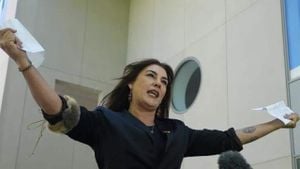The conversation around potential peace negotiations between Ukraine and Russia has gained momentum recently, underscoring the complex dynamics among international leaders and their strategies concerning the prolonged conflict. The call for negotiations is becoming more pronounced, with allies pushing Ukraine's President Volodymyr Zelenskiy to explore options for dialogue with Russian President Vladimir Putin, even as the war continues to devastate regions across Ukraine.
On November 15, German Chancellor Olaf Scholz held his first phone call with Putin since December 2022, marking a significant moment after nearly two years of stalled communications. The conversation spanned about one hour during which Scholz expressed Germany's unwavering support for Ukraine and condemned Russia's aggressive military actions. Notably, he urged Putin to withdraw his troops, stating, "It's about time to talk again, but the conditions must also be met."
Scholz's initiative to reengage with Moscow, came after months of increased military support to Ukraine from NATO countries. During this period, Ukraine's resistance to the almost three-year-long Russian invasion has been steadfast, thanks to international backing. Yet, the pressure from allies like Germany is rising, with calls for Ukraine to reconsider its approach to negotiations.
Despite Scholz’s enthusiasm for dialogue, the response from Zelenskiy and other Ukrainian officials has been less than supportive. Zelenskiy criticized the call, labeling it as "Pandora's box," which plays directly to Putin's strategy of manipulating perceptions of his willingness to negotiate. Ukraine's First Deputy Foreign Minister emphasized the potential risks tied to this approach, warning it could undermine the Western stance against the Kremlin.
Further complicate matters, EU foreign policy chief Josep Borrell expressed skepticism following the Scholz-Putin conversation. He noted how, immediately after the call, Russia intensified its military offensive against Ukrainian civilian infrastructure, which included drone attacks aimed at destabilizing the already strained energy sector. Borrell remarked, "Putin responds to any attempt at negotiations with powerful attacks on civilian infrastructure. This indicates he is not ready for peace talks at all."
The international community’s reaction has also been mixed. British Prime Minister Keir Starmer made it clear he has no intention of engaging with Putin, following the example set by Zelenskiy. The Finnish Foreign Minister Elina Valtonen, voicing her concerns, urged all Western leaders to halt communications with the Russian president altogether, aligning her perspective with those who fear talks would only serve to empower the Kremlin.
France’s President Emmanuel Macron signaled he might engage with Putin at the right time but echoed the skepticism surrounding the Russian leader's intentions. He argued, "We must understand the geopolitical chessboard before we make any moves."
This situation has led to questions about the future of Ukrainian resistance versus the pressures from allies to find common ground with Russia. Some experts suggest the continued push from allies might reflect their fatigue with the drawn-out conflict and the desire to find stability. Meanwhile, they caution against misinterpreting Russia's belligerence and claiming readiness for negotiations when it may simply be tactical maneuvering on Putin's part to alleviate some sanctions or international isolation.
Adding to the narrative of fluctuated determination is the speculation about the involvement of North Korean troops who, according to reports, have potentially been deployed to support Russia. This raised alarms over the seriousness of Russia's desperation for manpower and what this could imply for European security if sustained forces are engaged.
The multi-layered international negotiation puzzle also includes calls from other leaders of Western nations such as Donald Trump—whose views on foreign policy seem to lean toward bringing about quick resolutions to conflicts—suggesting he could envision ending the war rapidly if he returns to office. This political atmosphere adds yet another layer of complexity to the Ukraine-Russia discourse.
Aligning with Zelenskiy's concerns is the larger awareness among allies of the need to maintain solidarity to counter any perception of division, which could embolden Russia. The sentiment shared among various leaders during recent summits and discussions emphasizes the necessity to continue offering support to Ukraine, framing it as not just about fighting off aggression but standing against authoritarianism on the global stage.
Despite these hurdles, the conversation remains alive about what form peace talks could take if they were to materialize. With stakes so high and sentiments deeply entrenched on all sides, the path to any meaningful negotiation remains as complicated as it is uncertain. The international community watches closely, as each new dialogue or declaration either propels the prospect of peace or sends it spiraling back—a reflection of the war's chaotic and unpredictable nature. The resolve of world leaders, the strategic pressures they face, and above all, the harrowing impacts on the ground continue to shape the narrative of the Ukraine conflict, where every diplomatic overture appears fraught with peril.



